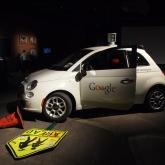
There is much debate these days about autonomous cars and who’s at fault when one of these vehicles is involved in a crash. Some say it is the automaker, while others say it is the software provider. What happened to the old days when the person driving the car was responsible for their actions? Up until a few weeks ago, no one could provide a viable response. However, a few parties have stepped up to the plate and have accepted responsibility for accidents when their computers are within the vehicle. These companies are Volvo, Mercedes-Benz and Google.
Two of these companies made a public statement on the popular television show 60 Minutes. Bill Whitaker was the correspondent who followed the story. They stated if their technology is at fault once it is commercially available, then they will accept all responsibility and liability in the matter. It’s a pretty straightforward comment that was given off the air. While that was Google and Mercedes-Benz’s take on the matter, Volvo went more public with their stance. Hakan Samuelsson is the president of Volvo. He made a statement for the company’s liability in Washington D.C. He stated that Volvo will accept the liability if the car is in autonomous mode. They are the first carmaker to make such a promise to the public.
The statements will give consumers more confidence about purchasing and driving these self-driving vehicles. Since confidence is generally lacking, according to surveys, it might be the boost sales needs. At this time, none of these car companies are selling autonomous cars to the general public. They also haven’t signed any legal documents that would make them bound to their statements. If they need suppliers to provide vehicle components, they might back out of their willingness to claim responsibility. Their statements also didn’t address who is at fault when the three companies are not even on the same playing field. Both Volvo and Mercedes are car makers that make these vehicles that customers will eventually purchase. However, Google will just provide the software to the car manufacturing companies, they won’t build the cars. So their liability should be relatively limited.
These statements were bold, but they really don’t resolve liability questions. Just a few weeks ago no one wanted the responsibility, now they all want to take on that challenge. It probably doesn’t really matter who wants to step up, trial lawyers will sue both the software company and the car manufacture anyway.

